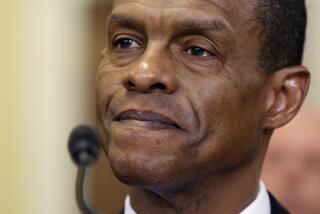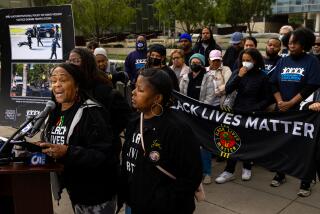No heroes in police beating
- Share via
Swaying in the pulpit at the First African Methodist Episcopal Church, the Rev. John Harper is preaching to “the brothers,” telling them to be there for their families, to discipline their children.
“It’s better that you put a belt across their butt now,” he says, “than a cop put a flashlight upside their head later.”
Harper doesn’t mention Stanley Miller. He doesn’t have to. The Midcity congregation roars in recognition.
The car-thief suspect initially evaded police, appeared to surrender, and, while down, was hit multiple times with a flashlight by a Los Angeles police officer while news helicopters caught it on video and televised it June 23.
Miller, 36, of Compton, is being held on a probation violation at the California Institute for Men. A probation report describes him as a longtime crack cocaine user, and court records indicate he has convictions for burglary and car theft.
In churches, at barbecues, over coffee, on black radio stations and at meetings, meetings and more meetings -- African Americans are talking about Miller’s brush with the Los Angeles Police Department, which, of course, leads to talk of Rodney King, another ex-convict who “starred” in an earlier and more brutal beating by the LAPD, which was also caught on videotape.
Though many decry what they think is another example of police brutality -- in the video, Miller appears to be already subdued by authorities when he was struck 11 times -- some refuse to glorify an ex-convict with a long rap sheet.
“A lot of people are frankly chastened by the fallout of the Rodney King case,” says Assemblyman Mark Ridley-Thomas (D-L.A.), who on Thursday convened 24 community forums throughout the Los Angeles area in Downtown, Watts, the Westside, East Los Angeles, Monterey Park, Westwood, South L.A., the San Fernando Valley, Inglewood and Compton.
The round-table discussions known as Days of Dialogue, explored how the Miller incident had been handled and police reform.
“Each time we hear Rodney King’s name, it’s often associated with another violation of the law, be it vehicular, be it domestic dispute, be it a range of things,” Ridley-Thomas says. “To celebrate Miller’s status is something that I think a lot of people are reluctant to do, because it’s reasonably clear that his arrest record and the like speak for itself. But in a democratic society, a suspect has rights that cannot be violated by law enforcement. It’s a matter of civil rights. It’s a matter of human rights.”
Human rights, yes, say many in black communities. Hero status, no.
“Don’t make this guy a hero,” says Kerman Maddox, a veteran Los Angeles political strategist and a member of First AME church. “He’s not Rosa Parks,” he says referring to the dignified black woman whose refusal in 1955 to relinquish her bus seat to a white man in Montgomery, Ala., advanced civil rights throughout the nation. “He appears to be a career criminal. People are saying they are kind of embarrassed about getting excited about someone who doesn’t represent the best of life in the African American community. Miller was committing a criminal act.”
“A lot of people are terribly conflicted. Everybody agrees that we are against excessive force and police brutality. On the other side, here we go again.... When do we have a discussion of how do we stop the Stanley Millers from terrorizing our neighborhoods? No one wants to say it publicly because it’s not politically correct.”
Crime as coffee shop talk
Politically correct or not, some African Americans are speaking out.
Every Saturday, author and activist Earl Ofari Hutchinson holds a weekly community round table at the Lucy Florence Coffee House in Leimert Park, a cultural heart of black Los Angeles. When the forum focused on the Miller case Saturday, Hutchinson says about 40 people showed up. Several people asked, “Why are you raising this issue when this guy is a criminal?” he says. “The fact that you had some people raise that caught some of us off-guard.”
Spirited discussions take place daily inside and outside of the Magic Johnson-owned Starbucks not far from LAX. The Miller case is no exception. The debates include whether the use of force was justified to the kind of person Miller is.
“I’m two-fold down the middle,” says Anthony Penn of Inglewood. “I’m not very sympathetic toward this man and his plight. And I feel strongly against the police brutality. The energies that I have in relationship to Stanley Miller are for the victim. Because out of all that we’re doing, all of the energy that we’re spending and some of it needs to be spent, I wonder about the victim. I don’t know the victim’s name.” (The owner of the stolen white Toyota Camry has not been publicly identified.)
Another Starbucks customer, Kevin Harbour of Los Angeles, says, “That guy [Miller] could have been me. I could have been scared. I could have said, ‘OK, I’m not going to run anymore, I’m just going to drop and stop and have the hell beat out of me, and then they find out it’s a mistake.’ Then what? Then I sue the city for a couple of million because of these idiots. They cost the city and us millions of dollars.”
He adds, “Also in terms of African American males, they keep picking the wrong guy to rally behind. They are a lot more cases where legitimate people are being stopped and harassed, and that’s not being dealt with.... Why don’t you take some of these guys, the politicians, the business people who get stopped and harassed and making a big deal of them. They have the means to fight back.”
A business owner, Ernest Riggs of Inglewood, says the crux of the matter is one of public-safety policy and how it is executed.
“The video kind of speaks for itself,” he said. “Right now, I’m concerned with policy and how the police officers execute it. A lot of people look at [the video] and say, ‘Yeah, it’s a horrible thing.’ Sometimes it’s not necessarily a racial thing, it’s more a policy problem.”
At another table at Starbucks, friends engage in a heated discussion about police chases, use of force, cops and adrenaline, female sergeants and what the LAPD has learned since the 1991 police beating of King.
“The police didn’t act as heroes. The guy who stole a car was no hero. You have two wrongs,” says Stag Brown as the friends talk over one another.
Such opinions are expressed on black radio stations too.
Connie Rice, a civil rights lawyer who has been involved in police abuse cases and is on the mayor’s commission investigating the Miller incident, routinely listens to the Steve Harvey Morning Show on 100.3 (KKBT-FM) and to Cliff Winston and the Home Team on 102.3 (KJLH-FM).
“About 55% of the calls were, ‘If he stole my car, I’d beat [him] too,’ ” she says, and, “ ‘Nobody cares about him besides his momma and his lawyer.’ ”
On a more serious note, Rice explains, “I know there’s ambivalence in the black community. You hear it on black radio. On the one hand, this isn’t just about some crackhead car thief.... When African Americans look at this video, they are not sympathizing with a crackhead car thief. They are thinking about 100 years of brutality.
“The issue is, when are we going to get a response from the police that acknowledges that this has been happening throughout the history of the LAPD, and what’s going to change this time? For me, this time, the change is the investigation.”
More to Read
Sign up for Essential California
The most important California stories and recommendations in your inbox every morning.
You may occasionally receive promotional content from the Los Angeles Times.













